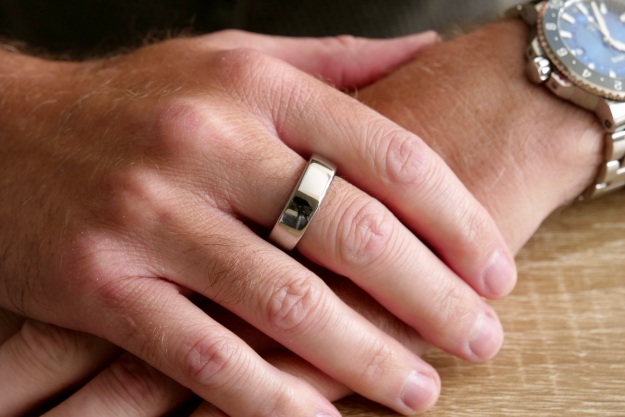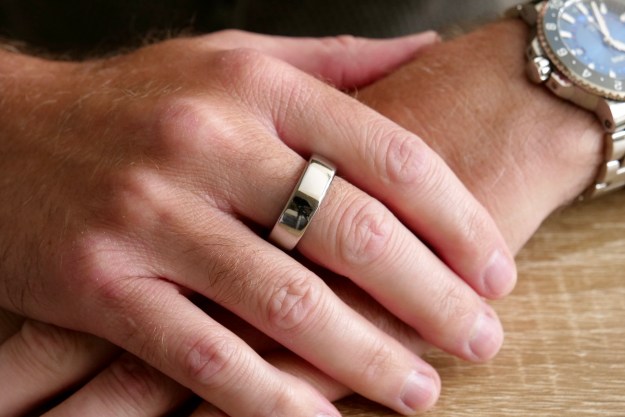
“The Oura Ring’s beautiful design, high-quality build, informative app, good battery life, and overall simplicity set it apart from other health and activity trackers.”
- Beautiful design
- Lightweight and comfortable
- Informative and easy to use app
- Accurate sleep tracking
- Wear-and-forget battery life
- Convenient charging
- Subscription required for app access
- No general fitness tracking
- Some people will need a smartwatch too
This review has been a long time in the making. I have been wearing the third-generation Oura Ring since the end of 2021, starting with the gloss black Heritage version before moving on to the polished silver Horizon model in 2022.
That’s around 18 months experience, and very few days have passed where I haven’t worn the Oura Ring, so I’m in the perfect position to say whether it’s worth buying or not. It is, but there are some things you really need to understand about it first.
What is the Oura Ring?
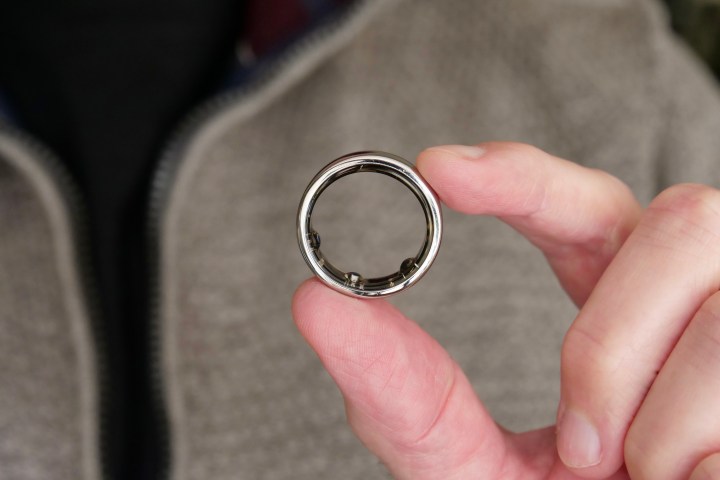
Before I get into the functionality, design, and cost of the Oura Ring, it’s worth explaining what it actually is, as it’s too easy to think that the Oura Ring is just a posh fitness tracker — but that’s not really correct. Understanding what it is, what it tells you, and how it fits into your life is very important to knowing if it’s worth the investment, and if it’s going to suit you personally.
It’s not a Fitbit or an Apple Watch — it’s smart jewelry that’s as much about your lifestyle as it is about tracking your activity. If you want a device that’s going to help you train better or prepare for a triathlon, on its own, the Oura Ring is not the device for you. Similarly, if you want notifications from your phone, this isn’t what you want either.

Instead, the Oura Ring tracks your sleep, heart rate, blood oxygen, heart rate variability (HRV), and other metrics (plus data collected from general exercise and activity) to provide an overview of your daily health and readiness. Insights into this data help you plan for the day, and understand where you can make improvements. Its closest competitor is the Whoop 4.0, another screenless tracker that highlights design, but its forte is exercise, fitness, and working toward improving yourself in these areas.
This is why the Oura Ring suits me better personally. I’m not interested in running faster, increasing my V02 Max, or crushing every goal to push my body to the limit. What I am interested in is using data to make changes to my lifestyle and activity routine to keep me healthy, and watching over trends to isolate situations that negatively affect my daily performance. I want to do this with a device that’s low maintenance and has a great design. The Oura Ring excels at this.
Oura Ring: design
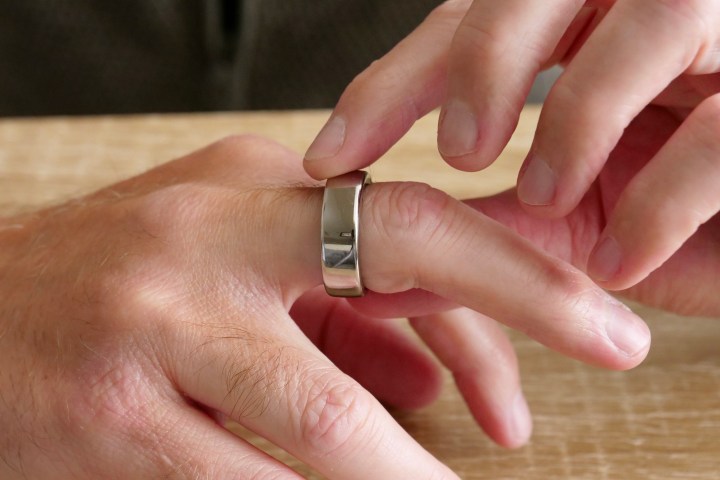
When I first wore an Oura Ring, I was concerned about comfort, as I’d never felt happy wearing a ring before. The prospect of wearing one 24 hours a day for years seemed unpleasant, as well as quite unlikely. However, it hasn’t been a problem at all. Oura supplies a sizing kit with plastic recreations of its rings, so you can try out different sizes to see which is the most comfortable. This is the best way to understand which one is right, and although you can base it on your existing ring size or buy one off the shelf in Best Buy today, I really recommend living with a fake plastic one for 24 hours first. If you accidentally get the wrong size, it’ll ruin the experience entirely.
The Oura Ring has become part of me, and I have no reason to take it off.
There’s a choice of two designs. The full circular Horizon or the Heritage model, which has a flat section to give it some character. I’ve worn both types, and there’s no difference in comfort or feel. Both look great, and I have really been taken with the polished silver Horizon version, which is surprisingly subtle, yet still glints in the sunlight. Like any good piece of jewelry, the Oura Ring has become part of me, and I have no reason to take it off from a style perspective.

Each model is made from titanium, with a non-metallic inner section, and it has never caused any skin irritation for me. All the Oura Rings I’ve worn have picked up scratches and marks, but none have dramatically detracted from the appearance. The worst offender was the matte Stealth version, where the finish did chip a little. The Oura Ring is water resistant to 100 meters.
The size doesn’t change the basic dimensions of the Oura Ring, which is 7.9mm across and 2.55mm thick. The weight varies between four grams and six grams, and I almost don’t notice it’s there. Initially, you will notice the thickness between your fingers, perhaps less so if you regularly wear rings, but it soon disappears. I think I’ve happily worn an Oura Ring for more than 650 consecutive days, and if that’s not a solid endorsement of design, quality, comfort, wearability, and durability, I don’t know what is.
Oura Ring: technology, sensors, and activity tracking
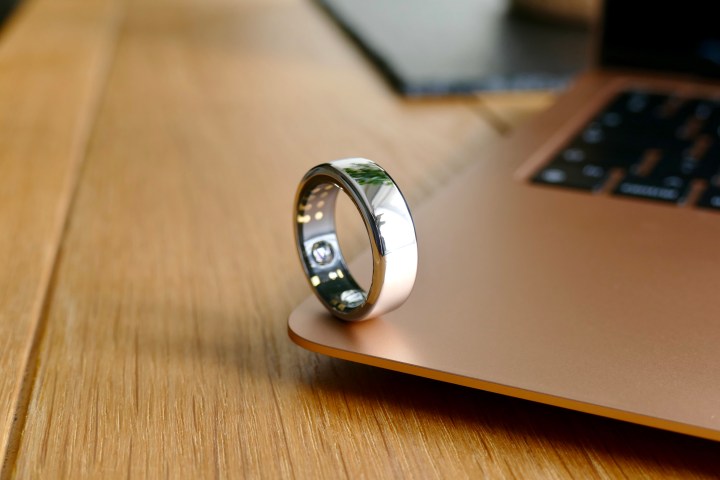
The Oura Ring is primarily a lifestyle-based sleep tracker, with added features for basic fitness tracking and period prediction, along with some guided mediations and unique features such as the ability to sync with the Natural Cycles birth control app. It does not have a screen, it doesn’t alert you about notifications from your phone, and it’s not the device to track activities like golf, or provide deep insights about your marathon performance.
For such a small device, it packs in a surprising amount of tech. Sensors measure your heart rate, blood oxygen levels, and skin temperature, along with your movement too. It connects to the Oura app on your phone using Bluetooth and syncs with Apple Health and Google Fit, so data collected from another device is taken into account by the Oura Ring (and vice versa).

Oura’s way of presenting its data in the app is simple, yet incredibly informative when you dig deeper. Neither Apple’s Health app or Google Fit have the same at-a-glance convenience of Oura’s Readiness, Sleep, and Activity scores. These are based on data collected from your sleep and daily movement, and you can instantly see how you’re set up for the day, how good your sleep was, if you need time to recover, and where you need to improve. All from just three primary numbers. It’s excellent.
It can track three primary activities — walking, running, and cycling — using steps and heart rate, plus GPS location from your phone. You can also manually add in a non-tracked activity, but it’s not ideal, and it does pull in activities tracked by Apple Health and Google Fit and add them to your daily scores. I’ve found the automatic workout detection to be accurate and reliable.
Oura Ring: sleep and activity data
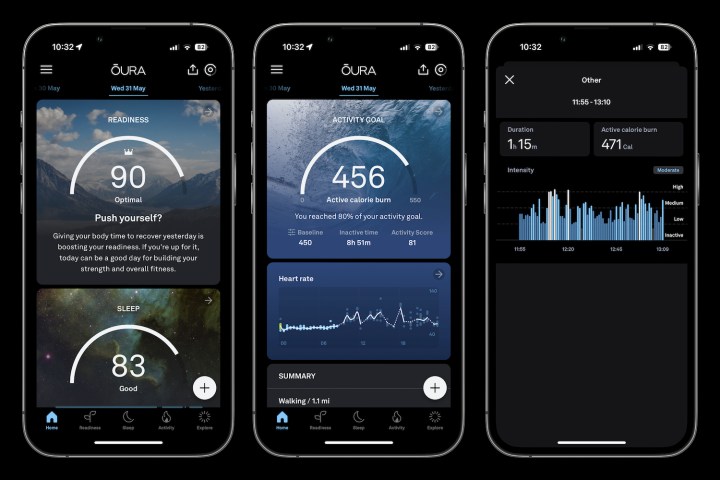
The Oura app presents data very clearly, with large and obvious numbers, scores, and graphs to illustrate your performance. All sections have additional data when you dig deeper, and the more you wear the Oura Ring, the more it understands you. The trends make a real difference not just to its recommendations, but also to how you personally understand your body. Its sleep staging algorithm is detailed and accurate, and it has unique data points, including your chronotype, so you can better understand sleep habits.
I can see my Heart Rate Variability (HRV) long-term and how it changes with my activity and stress levels, and even confirm how I feel in the mornings using it. The HRV, resting heart rate, and respiratory rate figures give a really great indication of how well recovered you are, and I’ve grown to recognize and understand the signs of exhaustion through them. In turn, the app’s Readiness score usually backs it up by saying I’m either looking good for the day, or I should take it easy. There’s even a Rest Mode that adjusts your daily goals accordingly, and is recommended by the ring when it notices you’re not at your best.
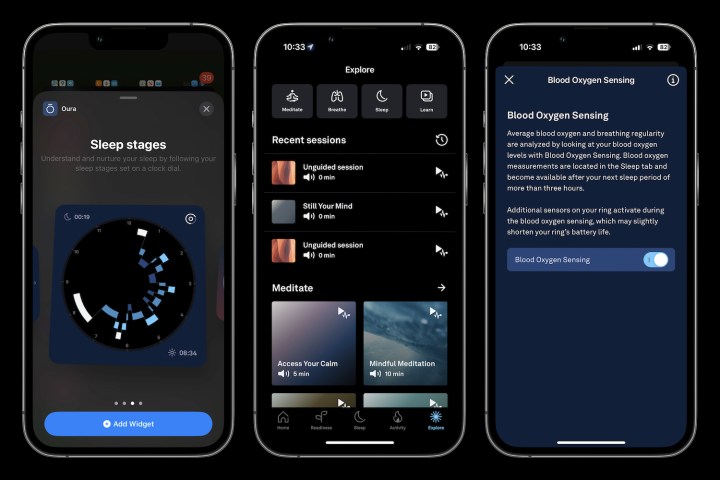
The Oura Ring does tend to overestimate step count, but the heart rate and calorie burn — a metric that can be hidden entirely if you prefer — matches other devices, and its overall sleep tracking data is very accurate. It automatically tracks sleep, and is very effective at knowing when you’re sleeping or awake. It neatly takes this into consideration when presenting its Sleep score, something not all devices do. Some include the time you spend awake in bed as “sleep,” which can skew results.
The app generates reports on a regular basis, highlighting your trends over set periods of time, which are presented very well and are very informative. The Oura Ring isn’t a medical device, so it stops short of making actual recommendations or analysis, but it’s good at balancing its interpretation of your data between being too general or glossing over key points. It means I understand what it says, and potentially act on it too.
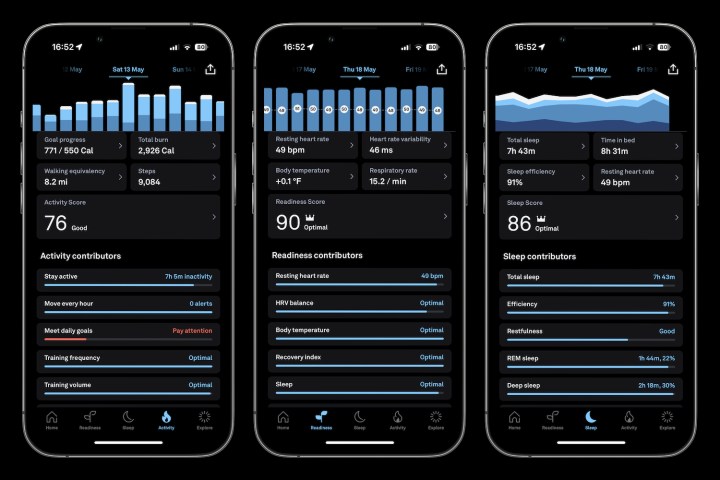
I like that the Oura Ring isn’t intrusive either. It doesn’t send dozens of notifications or constantly badger me to do something. It will prompt me to get up and move around, but that’s all. This lack of interruption is enhanced by its lack of a screen, so there’s never any visual push to up your step count or beat a personal best. While I find this a benefit, others will want the motivation, which may mean this isn’t a device for them. Remember, this isn’t a fitness tracker in the way a Fitbit or Apple Watch is.
Oura Ring: what isn’t so good?

Feature updates have taken longer than expected to arrive in the past, and some promised features are still missing. A general, catch-all fitness-tracking mode would greatly enhance the ring’s usefulness, but one still hasn’t been released. This brings up the question of whether the Oura Ring is enough of a health and activity tracker on its own. It may not be quite feature-rich enough for some people.
The solution is to also wear a fitness tracker, but it’s a big financial commitment to buy one along with the Oura Ring. However, in its current form, the Oura Ring complements smartwatches like the Apple Watch really well. Most smartwatches can’t match the Oura Ring’s excellent sleep tracking and data presentation, yet obviously improve on fitness tracking and add notifications and apps too.
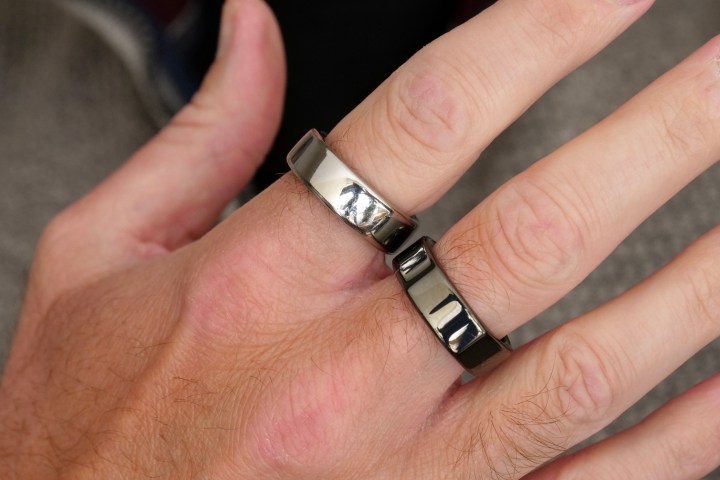
Wearing and using both may sound like overkill, but you’re not really doubling up on that much functionality. However, you’re only having to wear two devices because of the Oura Ring’s slightly limited feature set. On the more positive side, another consideration is if you’re like me and often wear a traditional non-smart watch, the Oura Ring is great as it doesn’t take up valuable wrist space, yet it still allows health and activity tracking.
The app contains a section on guided meditations and mindfulness sessions, which is a nice addition as these are more usually found in separate, paid apps. However, the lack of a comprehensive search function means it’s difficult to find what you want. The titles are too flowery to be informative, there’s no information on whether it’s a male or female voice, and no way to sort by the person guiding the session either. If you want to quickly find a new session by someone you like when trying to sleep, it’s frustrating, and that defeats the objective.
Oura Ring: women’s health

There are some features I can’t personally try out, but they are definitely worth highlighting. The Oura app includes period prediction, which it estimates based on body temperature. I have personally seen how accurate the Oura Ring’s body temperature measurements are, as it accurately caught my raised temperature that was bought on by a vaccine.
The temperature sensor also links the Oura Ring to the Natural Cycles birth control app, which removes the need to manually check and enter your temperature into the app. Natural Cycles is both Food and Drug Administration (FDA) and CE approved, and the Oura Ring’s integration meets those standards. Oura also notes no sensitive data is shared between the apps.
The Oura Ring needs to watch out later in 2023, though, as Movano’s Evie smart ring, which has been designed and built specifically for women, is scheduled to arrive. Not all the Evie ring’s features are known yet, but the company has said it won’t have a subscription fee, potentially making it better value than the Oura Ring. It’s one to keep an eye on if you’re looking at smart jewelry this year.
Oura Ring: battery life and charging
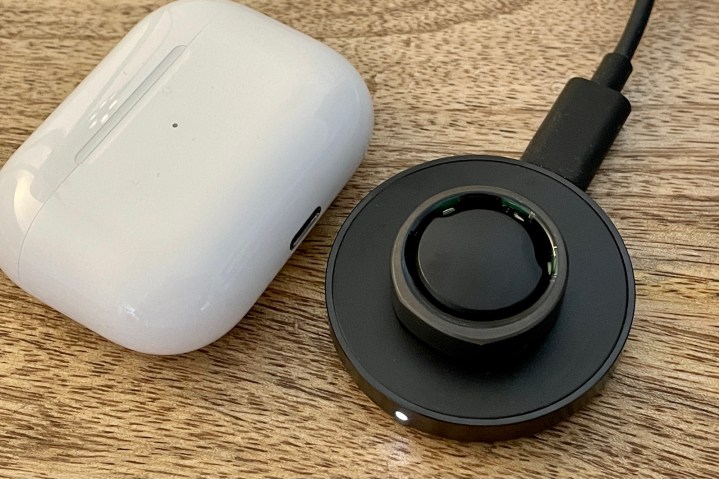
I’ve never experienced any battery anxiety with the Oura Ring, and I don’t think the battery has depleted more than once or twice. I don’t really think about charging it at all. How many wearables can you say that about? Surprisingly for such a small device, the battery life extends to around four or five days use with 24-hour-a-day wear, blood oxygen sensing, heart rate monitoring, and a 30-minute workout tracked up to twice during that period. This is lower than Oura’s expected seven days, but still perfectly adequate.
It’s not the length of the battery life that makes the Oura Ring so convenient, it’s the way you charge it. A custom plinth matched to the size of your ring is supplied, and I keep mine by my bed. Most mornings, I place it on the charger while I shower and get ready for the day, and this keeps it topped up with no meaningful interruption to wear time. It becomes a habit, and entirely removes any need to monitor how much battery life remains.
Oura Ring: price and subscription
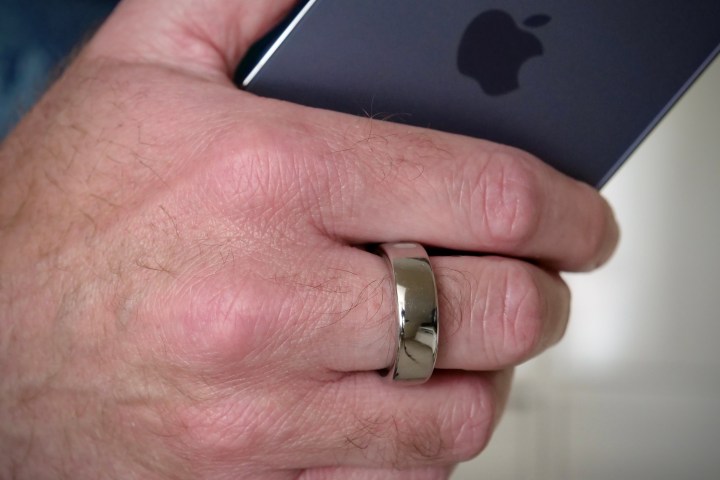
The cost of Oura Ring ownership varies depending on which style and finish you choose, plus it requires an ongoing subscription to continue seeing data in the app after a fixed period of time. The Heritage style starts at $299, while the Horizon starts at $349. This includes a single month’s access to the data in the Oura app, a change from the six months free access that used to be included with the ring.
The subscription costs $6 per month, and if you don’t pay, the app only shows your Readiness, Sleep, and Activity scores. Understanding the eventual cost of owning and fully using an Oura Ring is important. Over two years, the Oura Ring will cost a total of $487 if you choose the most expensive finish. For comparison, an Apple Watch Series 8 starts at $399, but does not require any further subscription.
The Oura Ring is one of the best pieces of wearable health tech I’ve ever used.
The subscription is a barrier to ownership. It’s not that the Oura Ring doesn’t provide good value — the data shown is interesting and easy to interpret. The app is also one of the best designed that I’ve used, certainly for a wearable, so you are getting a very high-quality product. The problem is, Garmin, Apple, Samsung and others provide their apps and data analysis for no additional charge.
I don’t necessarily feel I’m getting anything much extra for the subscription. Oura has also been slow at delivering meaningful feature updates in the past, and some promised changes are still missing. Remember, your personal data is very valuable, and here you are paying a company to present it inside an app. It’s admittedly doing so well, and the product is excellent, but it’s not dramatically different enough from the free options.
Should you wear the Oura Ring?
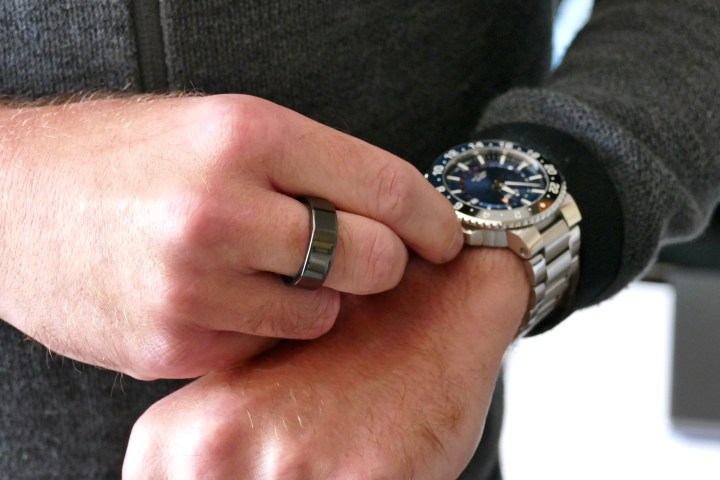
The Oura Ring is one of the best pieces of wearable health tech I’ve ever used. It’s really superb, and fits my lifestyle and requirements very well indeed. I genuinely have no reservations recommending the Oura Ring as a product at all. However, the subscription irks, because it’s hard to see exactly where the additional benefits are compared to free services that also analyze and compile your data.
It also makes this an expensive product, with the ownership bill closing in on $500 for two years of use, and $72 each year after this. If the feature set was comprehensive enough that I didn’t feel the need to also use another fitness tracker, then it may be slightly better, but as it is, I need to wear a smartwatch or a Fitbit to truly quantify all my activity and health. I’m not saying this stops me recommending the Oura Ring, but it really is an important consideration.
The Oura Ring is a very sticky product, and the amount of time I’ve worn it is a testament to its style, quality, usefulness, and convenience. If you want a beautiful wear-and-forget device that delivers interesting and helpful health data, and you don’t mind paying a monthly fee to access it, then it’s absolutely perfect.
Editors’ Recommendations
Services Marketplace – Listings, Bookings & Reviews
